Ashwagandha is an essential medicinal herb in the ancient Ayurvedic (natural healing) therapeutic methods of India. It’s popularly known as Indian Ginseng or Indian Winter Cherry. Categorized as an adaptogen, it aids in your body’s stress management, boosting brain function, lowering blood cortisol and sugar levels, and helping fight depression and anxiety symptoms. Ashwagandha is also known to have cancer-curing properties by inhibiting the growth of cancer cells.
Because of the abundant incredible benefits that ashwagandha offers, it is no surprise that many health supplements have come out into the market to allow the public to partake of its advantages. There are so many of these ashwagandha supplements that getting the perfect one for you can be a challenge. In this review, we present you with the ten best supplements containing the essence of this fantastic herb. We will then give you a run-down of the vital criteria with which to select the best ashwagandha supplement brand to meet your needs and preferences. We hope that at the end of this review, you would be able to find your way through the maze of options available.
Best Ashwagandha Supplements:
- Organic India Ashwagandha – Buy here Editor’s Choice
- Himalaya Herbal Ashwagandha – Buy here
- Planetary Ayurvedics Full Spectrum Ashwagandha – Buy here
- Pure Encapsulations Ashwagandha – Buy here
- NOW Foods Ashwagandha – Buy here
- NutriGold Ashwagandha Gold – Buy here
- Gaia Herbs Ashwagandha – Buy here
- Solaray Ashwagandha – Buy here
- Ayush Herbs Ashwagandha – Buy here
- Nature’s Way Ashwagandha – Buy here
Editor’s Choice Product: Organic India Ashwagandha
Our editorial team has unanimously agreed that Organic India Aswagandha the best ashwagandha supplement due to the following reasons:
- It is all-natural and all-organic.
- It utilizes non-GMO ashwagandha herb extract
- Gluten-free
- It has Halal and Kosher certifications.
- The product is backed up by a trustworthy, industry leader that cares for its customers and its farmer-partners.
Product Listings
1- Organic India Ashwagandha
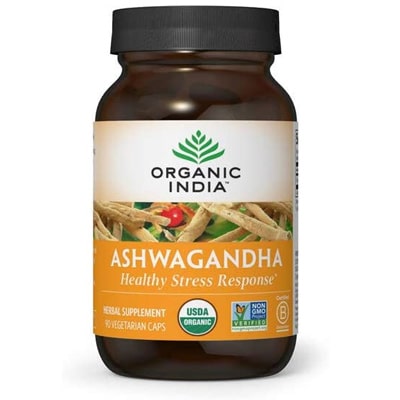
Organic India Ashwagandha is guaranteed as being organically manufactured. It consists of top-quality ingredients grown and harvested with care and devotion by small family unit farmers assisted by a highly reputable and established company.
The supplement can help fight stress and related maladies, mitigate anxiety & depression, boost immunity, lessen chronic fatigue, and overall exhaustion. It is also effective against colds, influenza, and bronchitis. The product can also help to alleviate premature aging and insomnia. Further research and study are required to reinforce all these claims, but current findings are very promising.
PROS
- Made of organic ingredients
- Contains no genetically modified (GMO) components
- Gluten-free
- HPMC vegetarian
- Halal and Kosher certified
CONS
- It does not have an introductory or trial size.
INGREDIENTS
Each serving size of Organic India consists of 2 HPMC veg capsules and contains:
- ashwagandha root extract (800mg)
RATING
Organic India Ashwagandha has a rating of 4.2 out of 5.
Who Makes It?
Organic India, a company established in Northern India in the 1900s, makes these ashwagandha supplements. The company is a conduit between small family farmers to the customers, thus helping the impoverished Indian community, at the same time providing True Wellness products to the different peoples of the world.
Organic India is fully committed to promoting and sharing healthy and natural lifestyles, as well as being a testament to the care and devotion poured into each bottle of the supplements.
2- Himalaya Herbal Ashwagandha
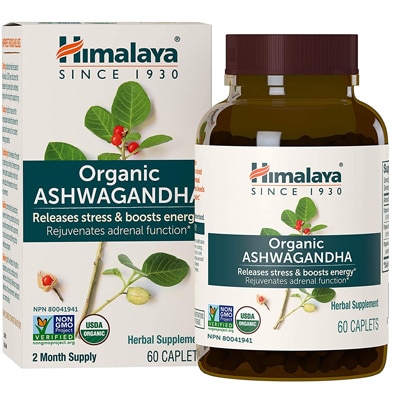
Himalaya Herbal Ashwagandha is an organic supplement that promotes “Happiness through Wellness.” It helps to boost energy, release stress and revitalizes adrenal function. Some further research is needed to support these claims.
PROS
- USDA-certified organic
- Gluten-free
- Non-GMO
- Vegan-friendly
- Does not contain corn, dairy, soy, and wheat ingredients
CONS
- Higher price tag
- Less potent
INGREDIENTS
Each serving of Himalaya Herbal supplement consists of one caplet containing:
- ashwagandha root powder 380mg (supplying 0.76mg withanolides)
- ashwagandha root extract 280mg (supplying 1.4mg withanolides)
- ashwagandha supercritical CO2 root extract 10mg (supplying 0.8mg withanolides)
- Approximately 3mg total withanolide substance
RATING
4.2 Out of 5
Who Makes It?
Himalaya is an established family-owned supplement manufacturer rising from its humble roots in 1930 and has since been highly committed to a scientific approach in production and research. Their product integrity has carried the company through several decades, keeping their respected position in the wellbeing and health industry.
3- Planetary Ayurvedics Full Spectrum Ashwagandha

Planetary Herbals Ashwagandha is a full-spectrum supplement that contains ashwagandha root powder as well as root extract. It also includes additional calcium, making it an excellent choice for people who need a calcium supplement. Its manufacturers refer to it as a rejuvenating tonifier formulated to enable the body in effectively adapting to psychological and physiological stress. The product is a botanical that revitalizes the body, calms the mind down, and boosts resistance against stress.
PROS
- USDA-certified organic and Non-GMO
- Gluten-free
- Vegan-friendly
- Does not contain corn, dairy, soy, and wheat ingredients
- Affordable
CONS
- Less potent
- Not standardized
INGREDIENTS
The recommended daily serving of two (500mg) capsules contains:
- ashwagandha root 500mg
- ashwagandha root extract 70mg
- calcium 59mg
RATING
4.2 Out of 5
Who Makes It?
Founded by leading herbalists Michael and Lesley Tierra, Alan Tillotson, and Jill Stansbury, Planetary Herbals combines the Aryuvedic and Chinese herbal traditions with the latest advanced pharmacological research to create top-quality supplements.
4- Pure Encapsulations Ashwagandha
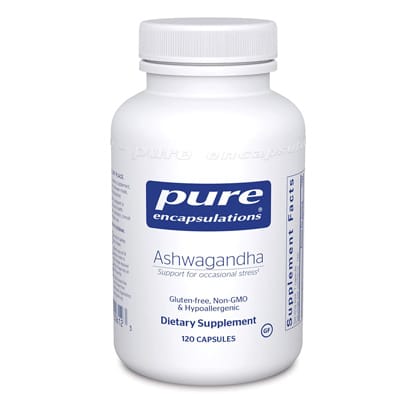
The Pure Encapsulations supplement helps in counteracting mental and physical stress. It also promotes the effective functioning of cardiovascular, cognitive, and immune systems.
PROS
- Non-GMO and USDA-certified organic
- Certified Gluten-free by the GFCO
- Vegan-friendly
- Soy- and dairy-free
- Hypoallergenic
CONS
- Not recommended for pregnant and lactating women
- Premium-priced
INGREDIENTS
Each vegetarian capsule contains:
- ashwagandha root extract 500mg
- withanolides 2.5% content
- hypoallergenic plant fiber (cellulose)
- water
RATING
4.2 out of 5
Who Makes It?
Pure Encapsulations take pride in delivering highly effective dietary supplements formulated from intensive research and pass through stringent quality control procedures. Their NSF-GMP certified manufacturing facility in Massachusetts processes only top-quality ingredients to produce GMO-free, hypoallergenic, and vegetarian supplements.
5- NOW Foods Ashwagandha
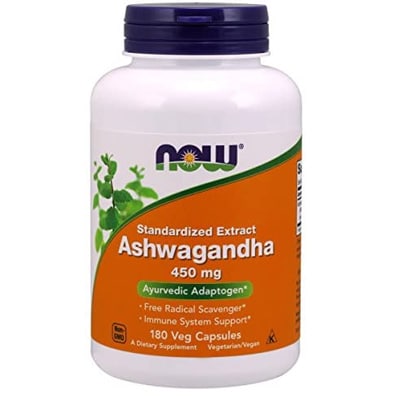
The Ashwagandha supplement from NOW Foods has general usage as a tonic and adaptogen, helping the body deal with momentary common stress. It is also known to promote a robust immune system by scavenging for free radicals in the body. Of course, further study is required to support the claims.
PROS
- Vegan/vegetarian
- Halal and Kosher accepted
- Non-GMO
- Gluten-, nut-, soy-, and dairy-free
- Very affordable
CONS
- Can cause stomach discomfort and digestive impediment
INGREDIENTS
Each NOW Foods capsule contains:
- ashwagandha root extract 450mg
- 2.5% withanolides 11mg
- Rice flour
- Hypromellose
- Stearic acid
The recommended dosage is 2-3 capsules (450mg) per day.
RATING
4.0 out of 5
Who Makes It?
NOW Foods has continuously been a quality-focused family-owned business since its establishment in 1968 in Illinois. NOW is entirely determined to provide consumers with health and wellness quality products. In keeping with their status, they produce one of the best ashwagandha supplements in the industry. Their production facilities are GMP certified and utilize the most stringent quality control methods.
6- NutriGold Ashwagandha Gold
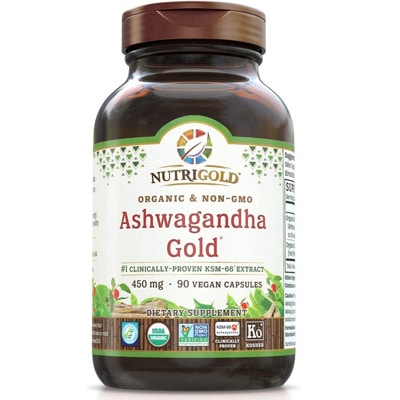
The Ashwagandha Gold supplement from Nutrigold is an adaptogenic product that enhances the body’s ability to fight against stress and recover from it quickly. It also promotes mental clarity, relaxation, and rest.
PROS
- Non-GMO verified and SCS-verified organic
- Free of most common allergens like gluten, soy, egg, etc.
- No harmful artificial additives
- Kosher certified
- Vegetarian
CONS
- May have detrimental effects on lactose-intolerant individuals
- Not recommended for pregnant and lactating women
INGREDIENTS
The recommended dosage is two capsules per day. Each NutriGold tablet (500mg) contains:
- organic ashwagandha root extract 300mg containing 5% withanolides
- organic full-spectrum ashwagandha root powder 200mg
- KSM-66 standard formula
- <1% withaferin A
- Contains lactic acid
RATING
4.0 out of 5
Who Makes It?
NutriGold is a family-owned wellness enterprise dedicated to producing top-quality, pure, and safe health products. Despite being one of the youngest companies in the industry, they have managed to stay at the top by being transparent, honest, and prioritizing safety over profitability. That is evident with their super-affordable yet quality-assured formulations.
A clear example of their commitment to safety is the refusal to use magnesium stearate, hexanes, or harmful additives in their products. They also subject their products to hundreds of tests conducted by reputable third-party laboratories to ensure they exceed all standards and expectations.
7- Gaia Herbs Ashwagandha
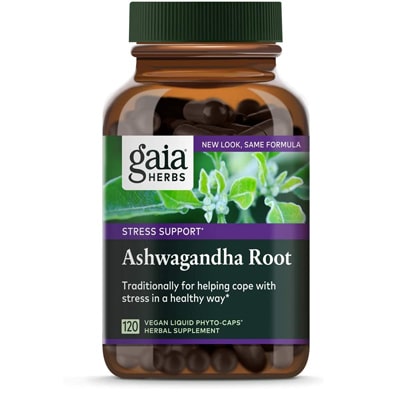
The Gaia Herbs supplements help to normalize sleeping patterns and promote an adequate inflammatory response. While it is also used to improve memory and learning capacity, it helps restore and nourish the ideal nervous and immune system wellbeing to provide a balanced energy level and mood.
Its innovative Liquid Phyto-Caps do not contain contaminants and harmful elements; they can be swallowed easily and absorbed instantly by the body.
PROS
- Vegetarian
- Organic
- Dairy and gluten-free
CONS
- Higher price tag
- Smaller dosage
INGREDIENTS
Each Gaia Herbs capsule (350mg) contains:
- ashwagandha root extract 350mg
- withanolides 5mg
- Each capsule contains 2,700mg dry herb equivalent.
RATING
4.5 out of 5
Who Makes It?
Gaia Herbs is a young, dynamic company established in 1987 in the Blue Ridge Mountains of North Carolina. They are fully committed to both their customers and their people, treating both partners in growth. The company is focused on producing top-quality products to assist people in attaining healthy well-being. Their patented Liquid Phyto-Caps delivery system allows for a pure as well as a speedy effect.
8- Solaray Ashwagandha
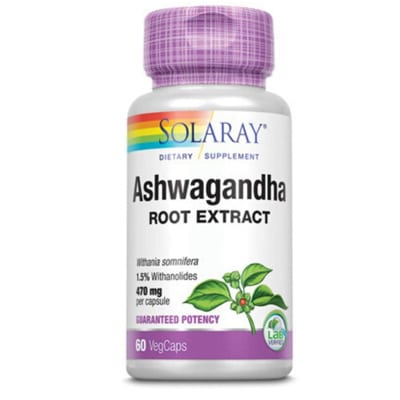
Solaray Ashwagandha is a supplement that promotes normal energy levels, enhances immunity function, reduces stress, and provides calmness. Current indications are very promising, and more research is needed to boost the claims.
PROS
- Standardized intermediate-potency formulation
- Vegetarian
- It contains no additives or preservatives.
CONS
- Less potent
- Contains tiny amounts of metallic compounds
INGREDIENTS
Each Solaray Ashwagandha capsule (470mg) contains:
- ashwagandha root extract 470mg
- 1.5% withanolides 7mg
- Vegetable cellulose
- Magnesium stearate
- Silica
RATING
4.2 of 5
Who Makes It?
Solaray was established in 1973 in Utah and has become a leading maker of dietary supplements. The company adheres to GMP rules, maintains strict screening and testing procedures, thereby making sure of their ingredients’ purity and their supplements’ potency.
9- Ayush Herbs Ashwagandha
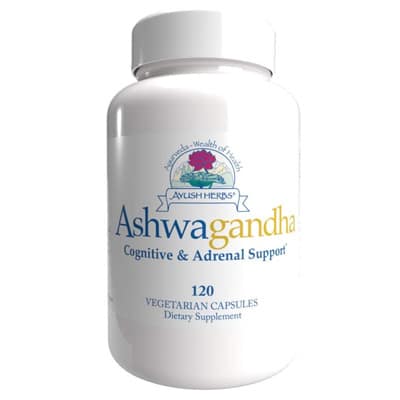
Ayush Herbs makes a good ashwagandha supplement that promotes healthy immune system activity, enhances thyroid function, and supports brain stimulation. It also helps the body fight against stress.
PROS
- USDA-certified organic
- Vegetarian
- Free of allergens such as wheat, egg, and soy.
CONS
- A bit more expensive
INGREDIENTS
Each Ayush Herbs capsule (500mg) contains:
- Ashwagandha 500mg
- Withanolides 25mg
(The recommended dosage is one capsule a day.)
RATING
4.0 of 5
Who Makes It?
A relative new-comer at thirty years, Ayush Herbs nevertheless has made a name for itself as a leader in supplement manufacture. Their goal is to combine the current advances of modern technology with the ancient Ayurvedic doctrines to produce effective, potent dietary supplements.
10- Nature’s Way Ashwagandha
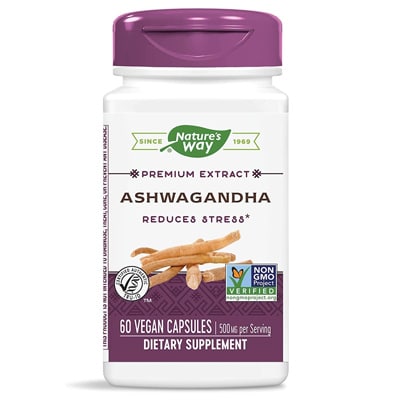
The Ashwagandha supplement from Nature’s Way promotes the reduction of stress and enhances bodily functions such as immunity and sleep regulation.
PROS
- Standardized formulation
- Vegetarian
- Non-GMO
- Gluten-free
- Affordable
CONS
- Not recommended for pregnant or nursing women
INGREDIENTS
Each Nature’s Way Ashwagandha capsule (500mg) contains:
- Ashwagandha root extract 500mg
- 3.5% withanolides 17.5mg
- Hypromellose
- Cellulose
- Magnesium stearate
(Recommended dosage is 2-3 capsules a day.)
RATING
4.0 of 5
Who Makes It?
Nature’s way, founded by Tom Murdock in 1968, has developed into a top-quality, scientific supplement maker. They utilize only the finest ingredients and employ stringent quality assurance methods.
Nature’s way is mostly regarded for being one of the foremost manufacturers to adapt Tru-ID verification, which guarantees the authenticity and accuracy of all label information.
How we ranked
Many ashwagandha supplements are currently available in the market, and they offer or claim a ton of things to do for you. As choosing the perfect brand can be very challenging, we provide you with a list of the factors that we used to assess each product.
Brand promise
Is the company promising to eradicate stress in ten days completely, and all it takes are a few capsules? Be wary of companies making unusual claims. Remember that wellness and stress level mitigation is not an overnight success, but a long and challenging endeavor.
Brand character
Are you familiar with this brand or company? Are they known in the health and wellness industry? Maybe you know a friend or acquaintance who knows them? You can check them out in Better Business Bureau or Trustpilot to make sure there is nothing doubtful about the brand before considering them.
Product format
Many ashwagandha supplements come in pill or capsule format; still, others come in powder form. The form doesn’t influence the product’s effectiveness so that you can make any choice according to your preference.
Quantities and amounts
Always be mindful of the number of capsules or pills per serving, as well as per container. This step also applies to products in powder form. All those features affect the overall product value.
Value for your money
First, look at the price; if it is too low compared to other brands, the dosages may not be enough or include untested components. On the other hand, if it costs so much, it should have the right amounts of essential ingredients.
GMO-free
An essential factor, the supplement must not contain any genetically modified organism.
Presence of metallic compounds and allergens
Most supplements contain Magnesium stearate and lactic acid. The former ingredient can cause stomach upset, while the latter can be detrimental to people with lactose intolerance. Another vital indication is the absence of allergens like gluten, egg, lactose, soy, corn, and others. Additional examples of compounds avoided are hexanes, toxic additives, and heavy metals. These harmful components are weeded early on at selecting raw materials and ingredients long before the introduction to the actual manufacturing stage. That way, it is easy to remedy a situation concerning said compounds.
FDA/GMP certifications
It is imperative to know that a product has safe and high-quality ingredients. One perfect way to find out is to check if the products are made in GMP/FDA approved or certified facilities and processes. There are other third-party certifications and seals for other essential matters about ingredients and components. Examples are Halal, Kosher, SCS Global, Non-GMO Project, USDA, and many others.
User comments
In case you don’t have acquaintances that have tried the product before, you can check out websites like iherb.com or Amazon, as well as other online sites related to health and wellness programs.
Who Should Buy Ashwagandha supplements?
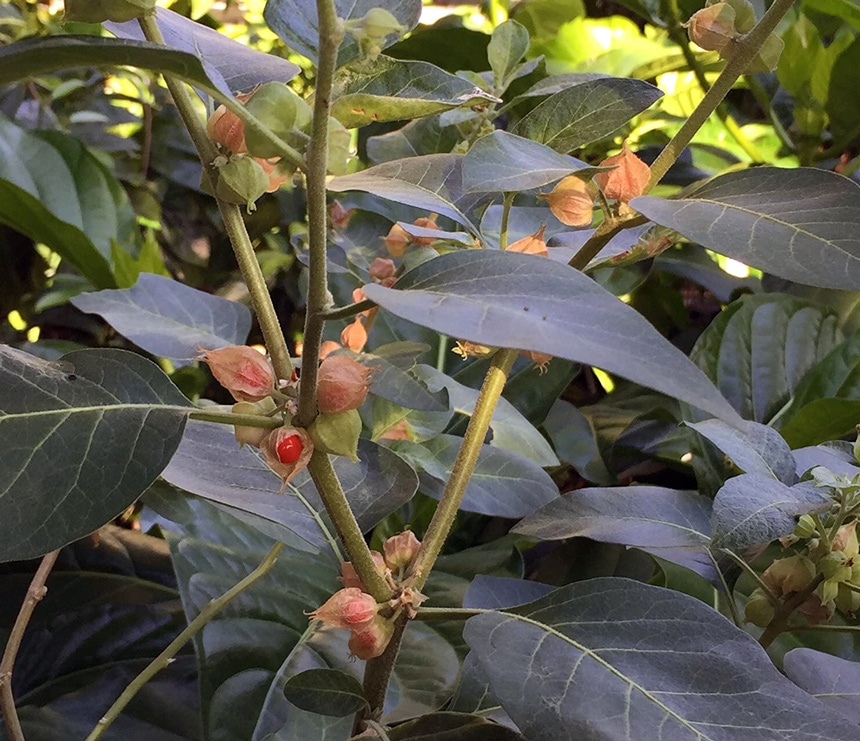

Individuals who undergo stress and anxiety
A clinical study indicated a substantial reduction in anxiety intensities in people getting ashwagandha extract, dietary counseling, and deep breathing method education. The results were evaluated with the standard ‘Beck Anxiety Inventory.’
Diabetic patients
Although still under study, ashwagandha has shown potential in regulating blood sugar levels in human clinical trials.
Individuals with high blood cholesterol
Research involving hypercholesterolemic lab rats have shown the promising benefit of ashwagandha as a cholesterol-reducing agent. Research exploring ashwagandha’s hypoglycemic (sugar-lowering) effects also frequently investigated its part in decreasing blood lipid levels. These researches have indicated a probable benefit, but more study is necessary.
Persons suffering from chronic inflammatory illnesses
A laboratory experiment showed a facility of ashwagandha to curb the creation of pro-inflammatory elements from patients with rheumatoid arthritis, compared to healthy volunteers.
Men with infertility or sexual performance problems
Ashwagandha root extract could be valuable in treating male infertility related to stress, as shown by a particular study. A separate but similar clinical study indicated an increase in testosterone and other sex hormone levels in males being studied for infertility, including an improvement in semen quality. That may be attributed to ashwagandha’s antioxidant potentials.
Persons wishing to boost muscle strength and mass
Ashwagandha extracts were shown to increase muscle strength and muscle mass and improve overall cardiorespiratory health in normal volunteers. However, this is possible only in combination with a rigorous training regimen.
Persons with Parkinson’s disease
Despite the absence of human clinical trials that investigate the use of ashwagandha in Parkinson’s disease, laboratory experiments have indicated a possible neuroprotective effect. That study revealed development in psychomotor and cognitive performance in healthy volunteers taking ashwagandha root extract supplements.
Cancer patients
Laboratory research has indications that some withanolide compounds could possibly have the ability to inhibit the growth of specific cancer cells in humans. Another study has shown that ashwagandha may prepare cancer cells for radiotherapy and may be utilized as an active agent in adjuvant chemotherapy.
Everybody else
Because of its aforementioned potential benefits and low-risk profile, ashwagandha can be safely used by healthy people who want to enhance their general wellbeing and health.
*It is essential to mention that the present evidence does not endorse using ashwagandha as individual therapy or replacing conventional therapy for each of the indications discussed earlier. We recommend consulting your doctor before altering your treatment regimen.
How Do I Choose a Good Ashwagandha Supplement?
You must always look for ashwagandha supplement brands that indicate the standardized % content of withanolides in their product. The most potent ashwagandha supplements may have up to 5% withanolides. That is the regulated limit of withanolides content as some of these components are poisonous when taken in large amounts.
You may see the term “KSM-66” stated by some brands; this is an extraction technique that regulates the withanolide content to approximately 5%.
The highest quality ashwagandha supplements are manufactured by renowned brands that abide by GMP (Good Manufacturing Practices) specifications, ensuring that the information indicated on the packaging is accurate. Some manufacturers even go an extra mile by employing independent laboratories to test the quality of their products to ensure they meet (and at times, exceed) set standards and criteria.
And most importantly, in quality and technical considerations, you would want to stay with organic ashwagandha supplements without GMO contents.
Price is also an indication of potency and effectiveness. Most of the ashwagandha brands have comparable price ranges, thus giving you a benchmark of a reasonable cost. Anything obviously too low or too expensive is doubtful, and you should take considerable care before purchasing.
Other bonuses would be certifications or seals of approval by reputable organizations within the health and wellness communities, quality circles, and standardization institutions. Examples of such are Halal, Kosher, SCS Global, USDA, among others.
Lastly, it wouldn’t hurt to check out the feedback from other users. You may have acquaintances that are familiar with some of the brands. Otherwise, hundreds of reviews, health and wellness websites and online shopping sites (like Amazon, iHerb, etc.) feature lots of user feedback. Most of these are excellent sources of information, not just for prospective buyers, but also for the manufacturers themselves as an alternative feedback system.
With all that in mind, you can now start your deliberation in choosing the best option that will suit your needs and preferences. For additional information to help you in your choice, please continue reading the following sections on ashwagandha’s benefits, possible side effects, dosage recommendation, frequently-asked questions, and our final summary with suggestions.
What Are Ashwagandha’s Benefits?
Ashwagandha is categorized as an adaptogenic herb prevalent in ancient Ayurvedic medicine. It has been utilized for several thousand years by traditional medicine specialists and only recently is modern science starting to catch up with olden practices.
Some of the most-studied potential benefits of ashwagandha include:
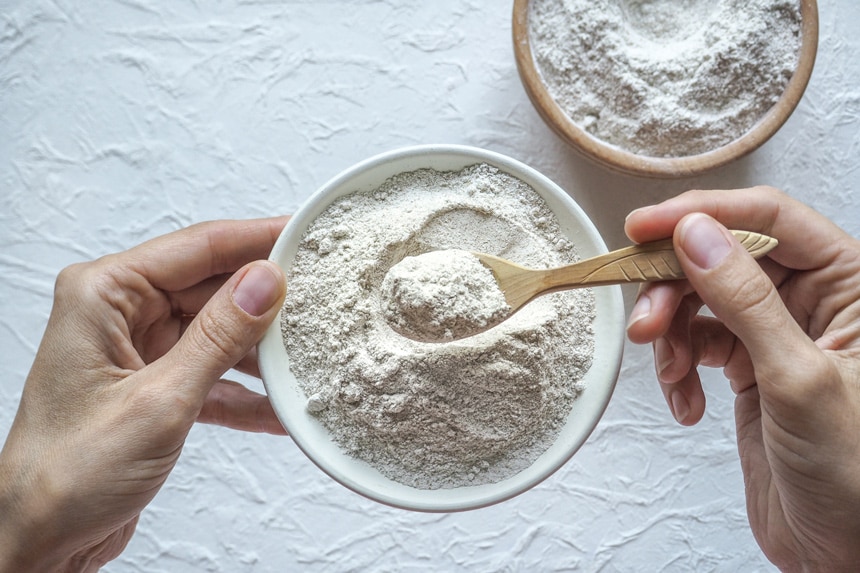

Stress and anxiety
Ashwagandha may have a beneficial effect on stress and anxiety levels in adults. In a particular study lasting 12 weeks involving two groups of patients, one set was given a standard psychotherapy treatment, while the other a naturopathic treatment program with ashwagandha. At the trial’s conclusion, the group administered with ashwagandha exhibited superior clinical benefits than the control group, with diminished anxiety and enhancements in social functioning and concentration. The study also discovered very few notable side effects, causing some experts to endorse ashwagandha as a possible alternative to anti-anxiety and antidepressant medications. Other studies have also revealed benefits for managing depression, but more investigation is necessary.
Thyroid functions
Ashwagandha may positively influence thyroid functions. Remarkably, it is believed that ashwagandha could aid both overactive and underactive thyroids. One recent study revealed ashwagandha to be advantageous in bringing thyroid levels to be reasonable in volunteers. While another study also observed developments in thyroid operation after administering ashwagandha. Further research is required, but ashwagandha has promising potential in confronting thyroid concerns.
Blood sugar
Ashwagandha may help to stabilize blood sugar levels. One animal study revealed that the phenolic compounds present in ashwagandha hold hypoglycemic properties that could maintain and balance blood sugar quantities in diabetic rats. It may also improve insulin resistance and inflammatory indicators, two factors of diabetes indications. An important note is that most studies probing ashwagandha’s potential influence on blood sugar are primarily animal studies. There is a need for more research on human participants.
Cancer
Ashwagandha could have anti-cancer properties, but more research is required. It is believed that the herb can help to inhibit the growth of cancer cells, due primarily to its immune-boosting and antioxidant properties. It is also thought that ashwagandha may reduce the side effects of current cancer treatments, causing many researchers to suggest it to cancer patients under treatment. Even, ashwagandha is thought to boost the white blood corpuscle count, thereby enhancing immune activity, thus helping to keep the body healthy. Most cancer treatments, including chemotherapy, typically reduce white blood cell count, so the introduction of ashwagandha to chemotherapy patients could be valuable.
Cognitive function
There are certain indications to advocate that ashwagandha could have a positive influence on memory and cognitive function in old age. Other studies have revealed that it may also aid in reducing the threat of acquiring Alzheimer’s disease and neurodegenerative illnesses. In several clinical findings, ashwagandha has exhibited the potential to improve memory, mental skills, and information processing in adults. Further research is required.
Immune system
Ashwagandha and similar adaptogens can help boost the immune system task by decreasing stress hormones in the body. They can also control inflammatory cytokines, elements helping to promote an anti-inflammatory condition inside the body. Studies involving animals have indicated positive results in this regard, but further research involving human subjects is required.
Endurance
Ashwagandha may aid in enhancing physical stamina and endurance, mainly with active persons. It is considered that the herb can diminish physical pain attributed to workouts. It could also stimulate brain function, promoting enhanced stamina and concentration. It is further believed to bring benefits in building muscles and strength. Further research is required.
Further to the above-mentioned potential benefits, ashwagandha is a powerful antioxidant having several beneficial compounds. Moreover, antioxidants are effective health boosters that can influence a vast array of health indicators. Further study is necessary on the herb, but the current evidence is quite favorable.
Side Effects of Ashwagandha
The known side effects are mild such as diarrhea, vomiting, and stomach upset with higher doses.
Due to a lack of comprehensive studies and evaluations of the effects of ashwagandha on pregnant women and lactating mothers, caution is strongly recommended.
Individuals diagnosed with any medical pre-condition should first consult their doctors before taking ashwagandha.
Most of the ashwagandha supplements do not recommend administering the product to pregnant women and nursing mothers. Also important is keeping the product away from children and minors. Of course, the best recommendation is to consult your doctor before consuming any of the supplement brands.
Ashwagandha is safe to use for about three months. Usage exceeding that time frame should be discontinued to avoid any undesirable effects. At this time, there is no significant research and studies exploring the long-term use of the herb.
Medical professionals also believe that ashwagandha use can affect the nervous system, especially when combined with anesthesia. Therefore, it would be best to avoid the intake of the herb about two weeks before any scheduled surgical procedure.
Ashwagandha may cause drowsiness and sleepiness, so it would be prudent to avoid taking it with sedatives to avoid severe effects.
Recommended Dosage for Ashwagandha
The customary manner of taking ashwagandha is by mixing the herb’s root powder with honey and ghee or combining it with tea. The more convenient way is taking it as a pill. The best ashwagandha supplements come in capsules that contain ashwagandha powdered whole roots or extract.
The recommended ashwagandha supplement dosage by most sources is from 500 to 1,000mg of the formulation each day. Even comparatively small doses are enough for you to feel the ashwagandha advantages.
You can notice a disparity among the best ashwagandha supplement brands’ dosages. So it would be better to verify the suggested ashwagandha supplement dosage particular to the brand before selecting it.
Ashwagandha Stacks
Several people suggest this particular ashwagandha combo for fighting anxiety and stress:
- ashwagandha 500mg at breakfast and dinner (1,000mg per day)
- bacopa 300mg once per day with food
Because bacopa and ashwagandha are both anxiolytics and adaptogens, the combo could cause decreased motivation and some lethargy. Should you experience that, you may replace the bacopa with 100mg of Rhodiola (a gentle stimulant) once a day with food. An alternative is by adding the Rhodiola to the ashwagandha stack, as mentioned above.
FAQs
What is Ashwagandha?
Ashwagandha or Withania somnifera is an herb that’s been popularly utilized for its medicinal potential for several centuries. Ashwagandha’s use as an herbal treatment takes its roots way back to Ayurvedic medicine, a traditional healing method of the ancient world.
What does its name mean?
“Ashwagandha” translates to the “smell of a horse” in Sanskrit and most probably alludes to the aphrodisiac and stimulating effects of the ancient herb. Additionally, it could also point to the particular smell of ashwagandha’s roots.
Where can you find ashwagandha plants?
The ashwagandha plant itself is robust and can grow and survive in severe conditions. It is known to exist in India, China, Nepal, and Yemen. Its stem can grow 2 meters in height, with branches that have red-orange fruits (similar to berries or small tomatoes) and green leaves. Those berries and the roots are the portions used for making medicine.
What Are Ashwagandha Supplements?
Ashwagandha supplements are usually created in capsule form containing ashwagandha fruit extracts or whole root powders. Withanolides, the principal active component of ashwagandha supplements, is the primary source of the herb’s medicinal benefits.
How potent are ashwagandha supplements?
Most of the best ashwagandha supplements can contain approximately 1.5-5% of withanolides. It must be pointed out, though, that not all withanolides are beneficial; withaferin A is a toxic ingredient that must be avoided. Top-quality ashwagandha supplements have tiny amounts of that compound, rendering them safe for consumption.
Recap
We have shown you the benefits of the ashwagandha herb and its subsequent supplement derivatives. Due to the herb’s almost miraculous medicinal properties, hundreds of supplements are available in the market, and choosing the best option for your specific needs and requirements can be challenging.
We hope that providing you with the proper guide indicating the features and particulars to be considered has helped you search for the optimal brand.
As a summary, we reiterate the need to check if the supplement brand you are considering has the necessary features, ingredients, certifications (USDA, non-GMO certs, Halal, Kosher, etc.). It must be manufactured in GMP-certified facilities and processes; it should be allergen-free (Gluten-free), and must not contain any heavy metals or contaminants. You should also verify its potency concerning the product’s value for your money.
Again we emphasize the importance of consulting with your doctor prior to consuming the available supplements, especially if you are pre-diagnosed with a medical condition.
Lastly, we would like to remind you that all the claims regarding benefits, general effects on health and wellbeing, of any of the ashwagandha supplements included in our list are based on current evaluations and usage. At this stage, there is no therapeutic evidence supporting the claims and are subject to further study, research, and evaluation.
